00:39
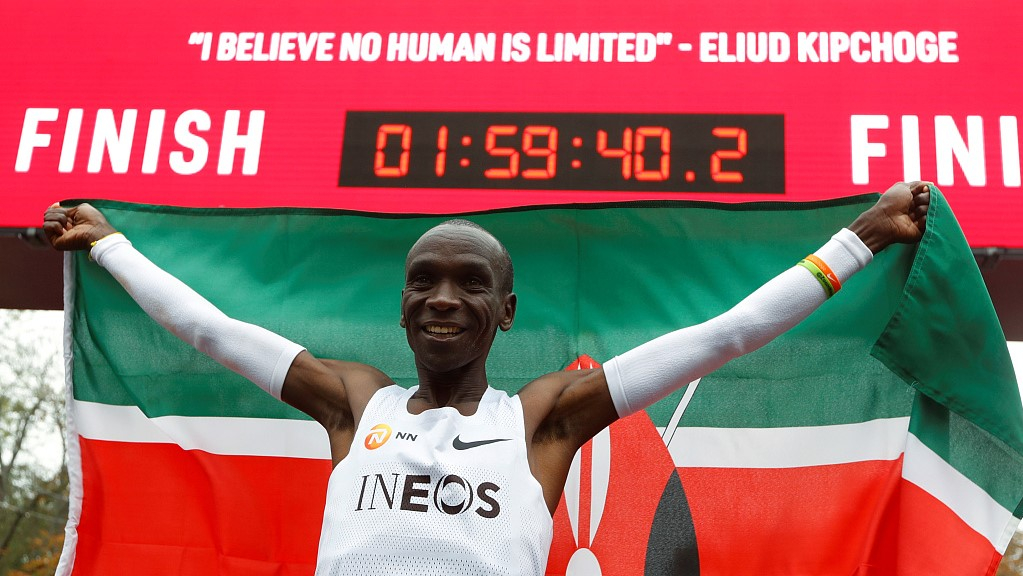
Kenya's Eliud Kipchoge on Saturday made history, busting the mythical two-hour barrier for the marathon on a specially prepared course in a huge Vienna park.
With an unofficial time of 1:59:40.2, the Olympic champion became the first ever to run a marathon in under two hours in Prater park, on a course readied to make it as even as possible.
The 34-year-old already holds the men's world record for the distance with a time of 2:01:39, which he set in the flat Berlin Marathon on September 16, 2018.
Accompanied by a posse of 41 pacemakers and a car in front of them setting the pace, Kipchoge bested that mark, making good on a failed attempt two years ago in Monza, Italy.
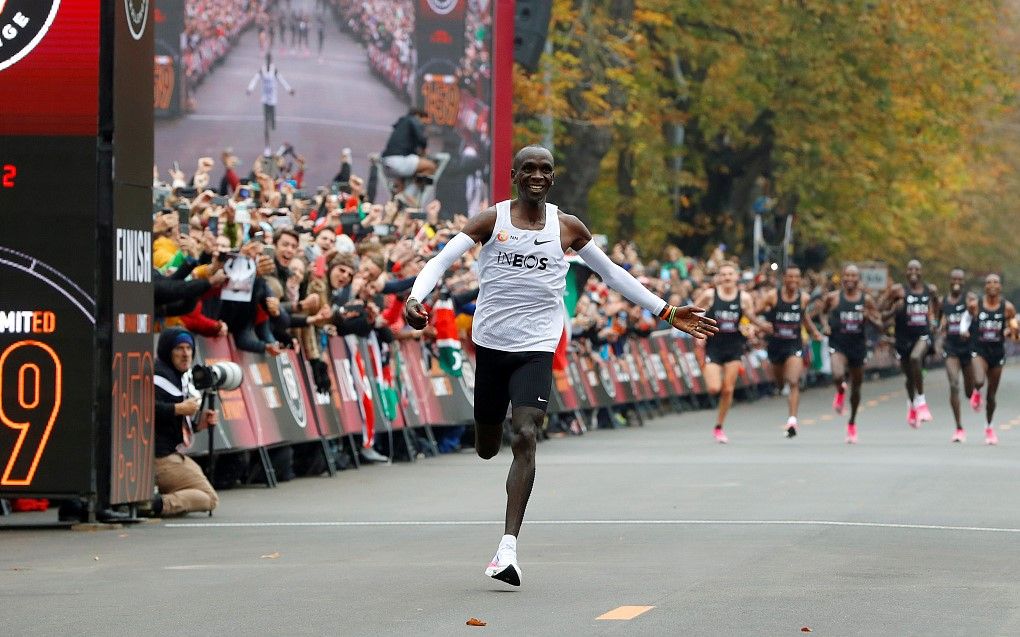
Eliud Kipchoge of Kenya crosses the finish line in his attempt to break the two-hour marathon barrier for human in a marathon race in Vienna, Austria, October 12, 2019. /VCG Photo
Eliud Kipchoge of Kenya crosses the finish line in his attempt to break the two-hour marathon barrier for human in a marathon race in Vienna, Austria, October 12, 2019. /VCG Photo
"I am the first man – I want to inspire many people, that no human is limited," said the history-making Kenyan.
"We can make this world a beautiful world and a peaceful world. My wife and three children, I am happy for them to come and witness history."
Maintaining a very regular pace at around 2:50 minutes per kilometer, he passed the finish line gesturing and smiling to the crowd gathered there.
He had been 11 seconds ahead of the pace needed at mid-race as fans lining the course, many waving Kenyan national flags, loudly cheered him on.
Kipchoge told reporters earlier this week that his attempt in the Austrian capital was about "making history in this world, like the first man to go to the moon."
"I just have to make that click in people's minds that no human is limited," he said after the race.
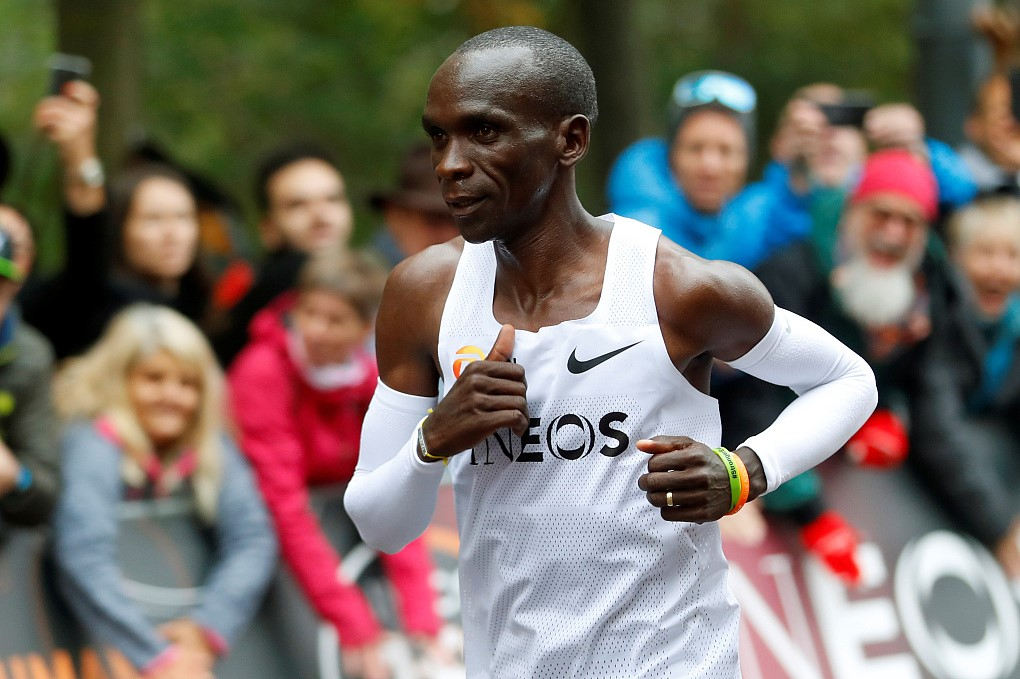
Eliud Kipchoge of Kenya runs in his attempt to break the two-hour marathon barrier for human in Vienna, Austria, October 12, 2019. /VCG Photo
Eliud Kipchoge of Kenya runs in his attempt to break the two-hour marathon barrier for human in Vienna, Austria, October 12, 2019. /VCG Photo
Because of the way the run was set up and paced the International Association of Athletics Federations will not validate the time as a world record.
The running surface had been partly retarred and readied with other features such as a banked corner that could save time and avoid injury.
Pacemakers took turns to support him throughout the 42.195-kilometer (26.219-miles) race. They included 1,500-meter Olympic champion Matthew Centrowitz and former world champion Bernard Lagat.
The course included a 4.3-kilometer-long straight alley, which the Kenyan ran up and down several times amid the dry but foggy weather.
"The course is extremely good. I'm happy with the course," Kipchoge, whose family has accompanied him to Vienna, said earlier this week.
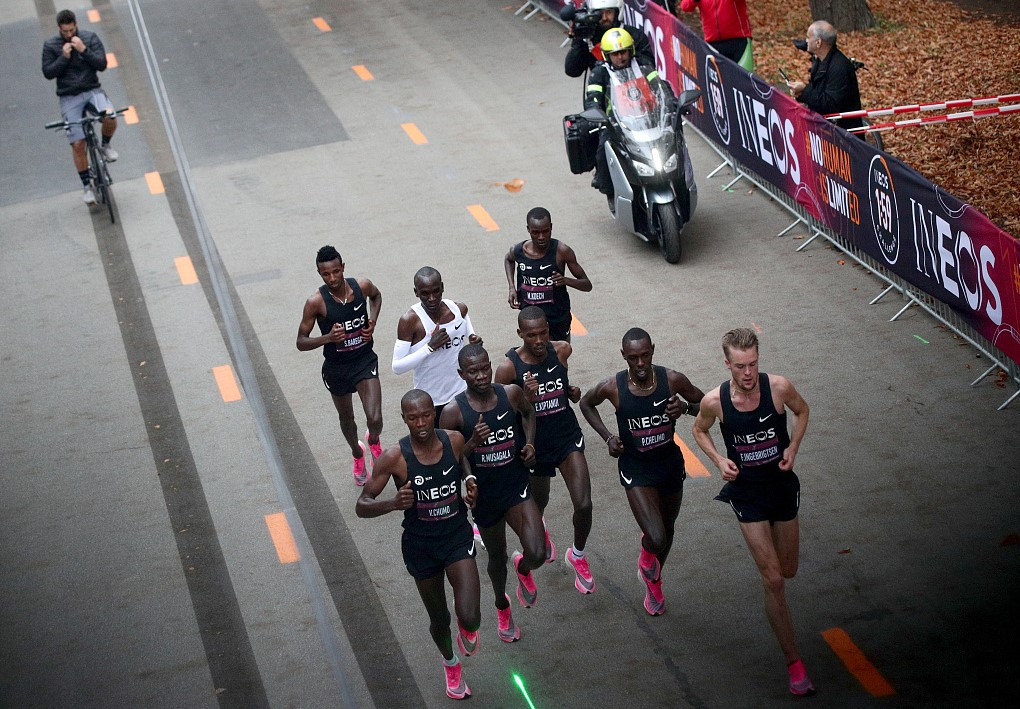
Eliud Kipchoge (C) of Kenya runs among seven pacemakers in his attempt to break the two-hour marathon barrier for human in Vienna, Austria, October 12, 2019. /VCG Photo
Eliud Kipchoge (C) of Kenya runs among seven pacemakers in his attempt to break the two-hour marathon barrier for human in Vienna, Austria, October 12, 2019. /VCG Photo
Chris Froome, leader of Ineos cycling team, also watched Kipchoge's race in Vienna, according to the organizers.
Organizers only allowed their own cameras to film the run itself.
Throngs of fans cheered on Kipchoge whenever he passed by.
"It's history in the making. I'm very proud…It will be a motivation to a lot of young people. People are looking up to him," said Nichasius Koech, 37, a software engineer from Kenya who works in Germany, ahead of the run.
Another fan, Joe Saissi, 25, from London said it was "a once-in-a-lifetime opportunity."
Kipchoge already tried in May 2017 to break the two-hour barrier, running on the Monza National Autodrome racing circuit in Italy, failing narrowly in 2:00:25.
But this time he said before the race that he was mentally stronger and more confident.
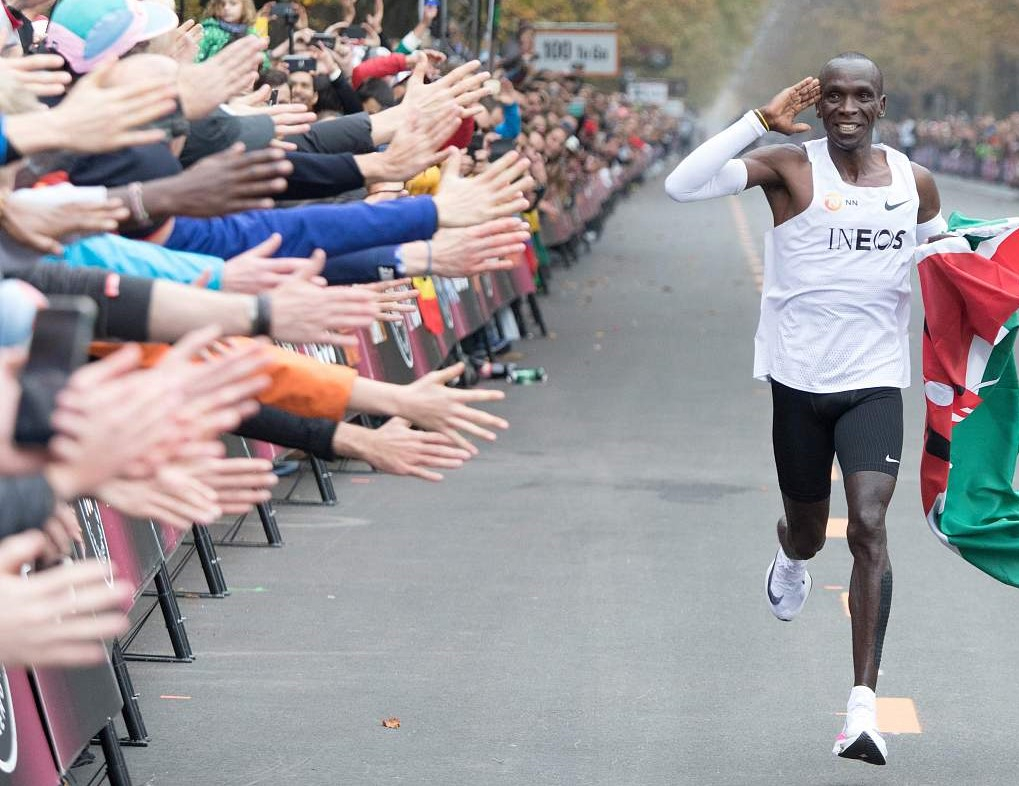
Eliud Kipchoge of Kenya celebrates after crossing the finish line in his attempt to break the two-hour marathon barrier for a human in Vienna, Austria, October 12, 2019. /VCG Photo
Eliud Kipchoge of Kenya celebrates after crossing the finish line in his attempt to break the two-hour marathon barrier for a human in Vienna, Austria, October 12, 2019. /VCG Photo
The course had been prepared so that it should take Kipchoge just about 4.5 seconds more than on a computer-simulated completely flat and straight path, according to analysis by sports experts at Vienna University.
In total, he only had to descend 26 meters in altitude and climb 12 meters, the experts said.
The founder of the main sponsors, Ineos, British billionaire Jim Ratcliffe, is taking a personal interest in the challenge and himself competes in Ironman triathlons.
The world marathon record has, for the past 16 years, been contested uniquely between athletes from Kenya and Ethiopia. The two nations are also fierce rivals for distance medals on the track.
Kipchoge's record was almost beaten last month in the Berlin Marathon by Ethiopia's Kenenisa Bekele, who ran 2:01:41, just two seconds short of the official world mark.
Source(s): AFP